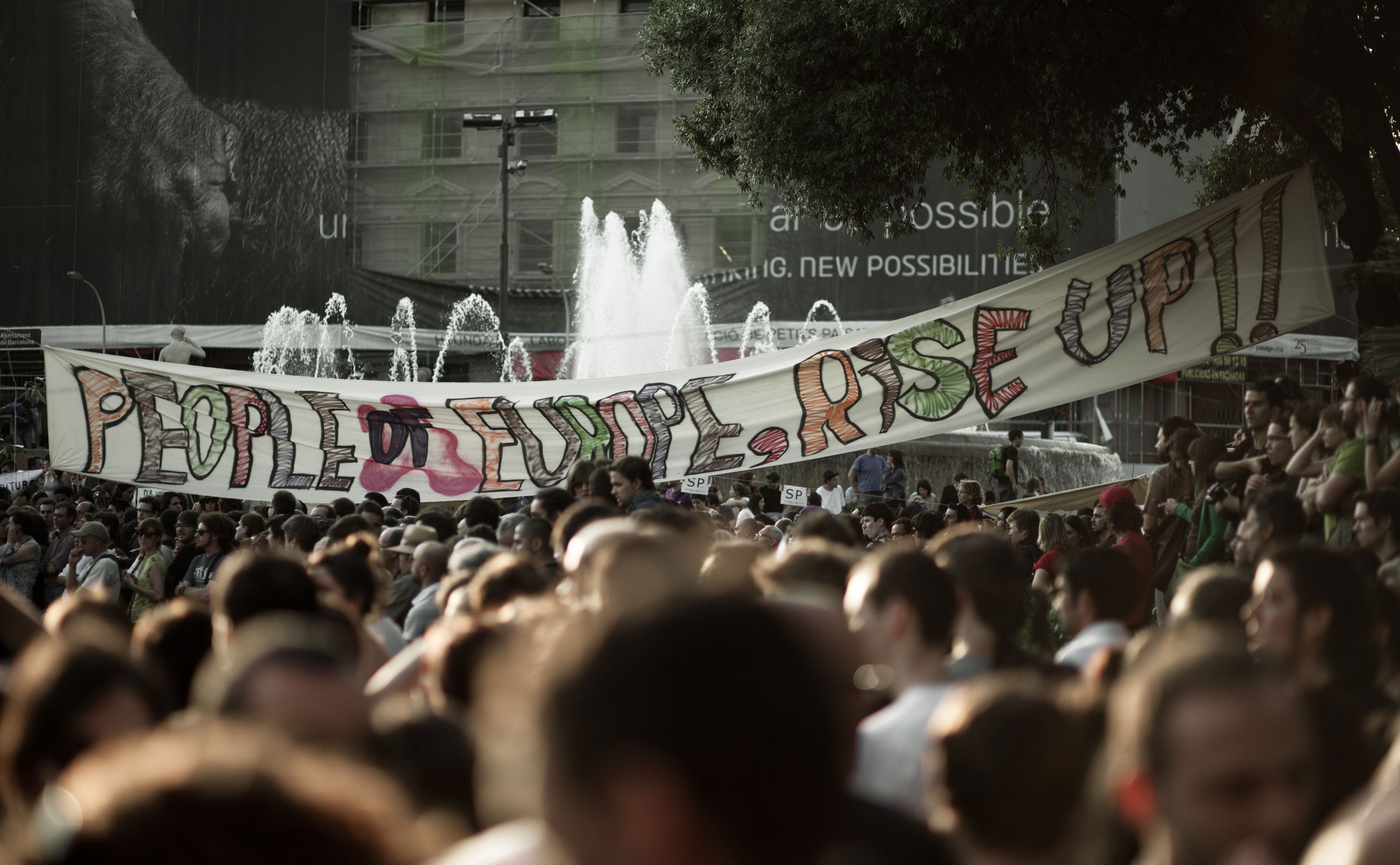Reclaiming and defending the commons in Turkey
Since 1984 where the urban population increased the rural population, cities became much more crucial for the politics in Turkey. The social movements arose in th cities inevitably carried out the character of oppressed classes and presented the first examples of the defence of commons at the neoliberal era against the attacks of companies and the state. First we witnessed neighborhood resistances as a result of the urban transformation and chanty towns. The resistance examples where the local communities took part in large numbers were crucial in the urban movements in 1990s based on their demands and organisational structure. These social movements evolve in 2000s with the rise of “middle class” or in other terms with the changes at the
structure of the working class and they fought for right to city.
We saw many inspiring resistance examples against the enclosure of public spaces in urban areas like the one defended the access to the coast against the piers at Bostancı, like the ones demanded right to water against the dominance of bottled water, like the ones protected urban gardens and parks against malls, like to one defended the unique character of the city at Emek Cinema against the private chains. We experienced the park and neighborhood forums, neighborhood solidarity movements, occupied houses and city solidarity movements after tje Gezi Resistance in 2013. All of these experiences left us a great heritage with many gains but also with some deficits.
Our goal at this web site is to foster the visibility of the experiences that defended commons in Turkey and to contribute in developing concepts on how to win our commons, also with the help of the experiences from the world.
From the Authors
Enclosure and the enclosure effect include the conditions necessary for creating their counter-effect or opposition. If the commons are based on a relatively strong sense of commoning, then the anti-enclosure struggles can also be expected to strengthen. The reason for this is that not only the commons but also the commoning community is targeted.

Alongside the basic arguments of commons literature, such as those that dwell on the right to the city, it is time that we discuss more contemporary perspectives. For example, as we are standing on the verge of a revolution in robotics, we should also discuss these in depth from the commons perspective and focus on the contemporary aspects of technological advancements that can ease the overthrow of capitalism.

The ‘emergent’ idea of the commons, as it emerged from within the global movement cycles in response to the economic, social, and ecological destruction of capitalism, offers a good starting point both for the survival of the planet and also for establishing an ethical common life for all.

When the economy is in trouble, commons are the first places where the government tends to intervene. Furthermore, bearing in mind the fact that the economy is expected to worsen in the future and daily life will be filled with much bigger problems, it can be said that urban commons-based movements are not only bound to increase in number but also gain more prominence.

Seeing the city as a common for solidarity movements working with migrants and performing commoning practices together is an important way of defining migrant rights from the ‘bottom’ and removing them from the nation-state scale.

The commoning of the social reproduction area, albeit for a temporary moment, involved not only the longing for a different kind of city but also the potential practices within that city. With regard to this layer, the Gezi uprising does not only refer to the transgression of the city but also further emerges from it as the envisagement of its reconstruction.

No one can know when a new wave of struggle will be born. Yet until that day solidarity academies provide us with a great opportunity so that the new imagination of labor can be positioned in daily practices.

The politics of commoning food is based on the organization of food initiatives that identify food as a common, construct rhetoric on the public level, and the organization of networks that realize food sovereignty by directly commoning food.

How to manage water and therefore how to ensure the right to water is an issue that is at the heart of the politics of water commons. Determining the priorities in water use inevitably appears as a struggle arising from class politics.

I believe we can learn many positive lessons from BeC (Barcelona in Common). Its road to the Town Hall was really impressive on lots of levels. And its victory greatly lifted those fighting for a better city and world, and demoralized our opponents.

Articles
Assoc. Prof. Bülent Duru: What are the Commons? On Natural, Urban, Social Commons and their Effects on Urban Social Movements
Bülent Duru discusses the potentials of the politics of the commons at his article and he conducts a debate on the possible reasons why movements fighting to defend the social and cultural commons tend to be much weaker than other social movements that have emerged in the field of natural and urban commons.
Prof. Aykut Çoban: Ecological Commons and Enclosure Polices in Turkey
Aykut Çoban begins his article with a discussion on the concept of the commons. He prefers to use the term ‘ortaklaşımlar’, which focuses on the commonalities of the commons, rather than the more widely used ‘müşterekler’. With a focus on the ecological commons, Çoban expounds the historical role of primitive accumulation in the enclosures of the commons, and moves on to the specific types of policies implemented as regards the enclosures of the ecological resources in Turkey.
Assoc. Prof. Ümit Akçay: The Crisis of Capitalism and the Commons
Ümit Akçay lays much emphasis on the potentials inherent in the politics of the commons for an anti-capitalist movement during financial crises. Akçay begins his article by touching upon the causes of the global financial crisis of capitalism in 2007-8, the mainstream economic policies implemented so as to exit the crisis, and its short-term consequences. Scrutinizing the alternative policies devised to curb the crisis, he focuses on the contributions that the politics of the commons have to offer.
Assoc. Dr. Begüm Özden Fırat: Global Movement Cycles and Commoning Movements
Begüm Özden Fırat reads the concept of the commons through social movements in her article. Although it is quite possible to find previous movements on commons, she explains in this article that there are mainly two global movement cycles that have certain effects on the present. The first of these is the anti-globalization movement, which began with the blocking of the WTO (World Trade Organization) meeting in Seattle in 1999 by protesters. The second is the squares and occupation movements that started in 2011. Fırat indicates that the experiences of commoning practices within these two cycles play a crucial role in organizing anti-system alternatives; nevertheless, she further explains that such movements begin to lose their global networks and interactions as they experience difficulty in gaining continuity, which leaves them in isolation from movements.
Dr. Fırat Genç: Urban Opposition and the Politics of the Commons in Istanbul
Fırat Genç addresses the urban commons in the context of the gentrification that Istanbul has endured in the 2000s and the emergent urban resistance movements specific to this period. Genç explains three urban movements within this framework: neighborhood solidarities that emerged against urban transformation projects, mobilizations that have arisen so as to defend public spaces, and the Gezi Resistance.
Can Irmak Özinanır: Where do the Solidarity Academies Stand in Relation to the Commons?
Can Irmak Özinanır provides a discussion on whether or not the organizations such as solidarity academies and the Street Academy, which emerged out of the campaign “We will not be a party to this crime” by Academics for Peace, are expected to generate a new form in terms of the politics of the commons, as well as the potentials and limitations that it presents.
Dr. Lülüfer Körükmez: Thinking Migrant Solidarity Movements within the Commons
Lülüfer Körükmez, in her article, poses the question of how approximately four million refugees, who remain excluded from the social movements in Turkey, could actually be included in the politics of the commons. She highlights the experiences of a limited number of migrant solidarity movements that are trying to include migrants in their struggles and a number of networks in that area.
Umut Kocagöz: The Commons Politics of Food
In his article, Umut Kocagöz discusses the possibilities of describing food as a common through the critique of the industrial food system. After presenting a discussion on why and how food should be defined as a commons, Kocagöz offers an insight into the origins of the food issue in Turkey together with the commons politics of food. Finally, he expands on the commonization of food and the strategy of creating commons politics of food through four key tactics.
Dr. Özdeş Özbay: The Politics of the Water Commons
In his article, Özdeş Özbay outlines two landmark struggles, namely the Italian Forum of Water Movements and the Cochabamba Water Wars, which recognize water as a common and bring the issue of the water commons onto the agenda of social movements. He then introduces the Blue Communities Project and the Barcelona in Common movement, which are municipal experiences that recognize water as a common by dint of the struggles of social movements from below.
Luke Stobart: The Commons Experiment in Barcelona
Luke Stobart points out the experiences of the Barcelona in Common movement, which won the local elections in Barcelona in 2015. Stobart discusses the origins of the movement, the theories that influenced it, its ensuing practices after winning the elections, and the problems it had to deal with. Finally, he poses the question whether the movement is in need of different political strategies.
Credit for Photo 1:Indignats / Indignados / Indignés ![]() by Julien Lagarde · Photo 2: Indignados
by Julien Lagarde · Photo 2: Indignados ![]() by Abel Francés Quesada · Photo 3: The urban evolution of vegetation
by Abel Francés Quesada · Photo 3: The urban evolution of vegetation ![]() by Dave C · Photo 4: Topkapi bathroom ceiling
by Dave C · Photo 4: Topkapi bathroom ceiling ![]() by Héctor de Pereda · Photo 5: (2014 11 29) Hurdacılar Sitesi Vol.2
by Héctor de Pereda · Photo 5: (2014 11 29) Hurdacılar Sitesi Vol.2 ![]() by Cihat Ertem · Photo 6: Indignats / Indignados / Indignés
by Cihat Ertem · Photo 6: Indignats / Indignados / Indignés ![]() by Julien Lagarde · Photo 7: Under my umbrella
by Julien Lagarde · Photo 7: Under my umbrella ![]() by Tuncay · Photo 8: NYU Library
by Tuncay · Photo 8: NYU Library ![]() by Shiyang Huang · Photo 9: Las Vegas
by Shiyang Huang · Photo 9: Las Vegas ![]() by Si B · Photo 10: 406784017
by Si B · Photo 10: 406784017 ![]() by Yulia Grigoryeva · Photo 11: City and a glass
by Yulia Grigoryeva · Photo 11: City and a glass ![]() by M.G. Kafkas · Photo 12: Correfoc
by M.G. Kafkas · Photo 12: Correfoc ![]() by Julien Lagarde· Photo 13: Indignados
by Julien Lagarde· Photo 13: Indignados ![]() by uchiuska
by uchiuska
















